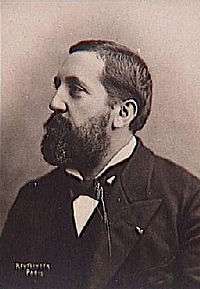Émile Pessard

Émile Pessard; photograph by Charles Reutlinger (about 1880).
Émile Louis Fortuné Pessard (29 May 1843 – 10 February 1917) was a French composer.
Pessard was born and died in Paris. He studied at the Conservatoire de Paris, where he won 1st prize in Harmony. In 1866 he won the Grand Prix de Rome with his cantata Dalila which was performed at the Paris Opera on February 21, 1867. From 1878 to 1880 he was inspector of singing at Paris Schools, in 1881 he became professor of Harmony at the Paris Conservatory.
His students included Maurice Ravel, Jacques Ibert, William Molard,[1] Albert Seitz[2] and Justin Élie.[3] After 1895 he was a critic and director.[4] He composed many comic operas and operettas, as well as masses.
Works
- Dalila (cantata, 1866) Prix de Rome[5]
- La Cruche cassée (comic opera in 1 act, libretto by Hyppolite Lucas and Emile Abraham, premiered on February 21, 1870 at the Théâtre de l'Opéra-Comique in Paris)
- Don Quichotte (opera, premiered on February 13, 1874, at the Salle Erard in Paris)
- Le Char (opera, premiered on January 18, 1878, at the Théâtre de l'Opéra-Comique in Paris)
- Le Capitaine Fracasse (opera, premiered on July 2, 1878 at the Théâtre Lyrique in Paris)
- Tabarin (opera, premiered on January 12, 1885, at the Théâtre de l'Opéra in Paris)
- Tartarin sur les Alpes (comic opera, premiered on November 17, 1888, at the Théâtre de la Gaîté in Paris)
- Les Folies amoureuses (comic opera, premiered on April 15, 1891 at the Théâtre de l'Opéra-Comique in Paris)
- Une Nuit de Noël (opera, premiered in 1893 at the Ambigu in Paris)
- Mam'zelle Carabin (comic opera, premiered on November 3, 1893 at the Bouffes-Parisiens, Salle Choiseul, in Paris)
- Le Muet (opera in 1 act, 1894)
- La Dame de trèfle (comic opera, premiered on May 13, 1898 at the Bouffes-Parisiens, Salle Choiseul, in Paris)
- L'Armée des vierges (comic opera in 3 acts, premiered on October 15, 1902, at the Bouffes-Parisiens, Salle Choiseul, in Paris)
- L'Epave (comic opera in 1 act, premiered on February 17, 1903, at the Bouffes-Parisiens, Salle Choiseul, in Paris)
Recordings
- Émile Pessard - Vingt-cinq pièces pour le piano. Olivier Godin. XXI-21 Productions. 2011
- 2 songs on collection: L’invitation au voyage Mélodies from La belle époque : Le spectre de la rose (Théophile Gautier), Oh! quand je dors (Victor Hugo). John Mark Ainsley (tenor) Graham Johnson (pianist). Hyperion Records
Sources
- ↑ Stephen Zank Irony and Sound: The Music of Maurice Ravel 2009 Page 236 "Through Schmitt and Delius, then, Ravel entered the differently Bohemian salons of Gauguin and the Franco-Norwegian composer William Molard, a government clerk and composition student of Émile Pessard,.."
- ↑ Nancy Toff - Monarch of the Flute: The Life of Georges Barrère Page 30 2005 " the young violist Albert Seitz, which received its premiere. Seitz was an auditor in Émile Pessard's harmony class ..."
- ↑ Michael D. Largey Vodou Nation: Haitian Art Music And Cultural Nationalism 2006 "Justin Elie (1883–1931) enjoyed the most prominent international reputation of all the Haitian composers; ... Wilfred Bériot for piano, Émile Pessard for harmony, and Paul Vital for composition (Dalencour 1983; Herissé n.d.)."
- ↑ Peter Lamothe Theater Music in France, 1864-1914 2008 Page 286 "Revived at the Odéon, 11 April 1901 with musical direction by Émile Pessard."
- ↑ Annegret Fauser, Mark Everist Music, Theater, and Cultural Transfer: Paris, 1830-1914 2009 Page 136 "(Its final round required the contestants to compose a lyric scene, an unstaged mini-opera referred to as a cantata.) ... Théodore Dubois (1861), Charles Ferdinand Lenepveu (1865), Émile Pessard (1866), and Henri Maréchal ...
- The Biographical Dictionary of Musicians, p. 332, 1940, Blue Ribbon Books, Inc. (Original (c) 1903)
- Emile Pessard's Works (German)
|
This article is issued from Wikipedia - version of the 3/22/2016. The text is available under the Creative Commons Attribution/Share Alike but additional terms may apply for the media files.